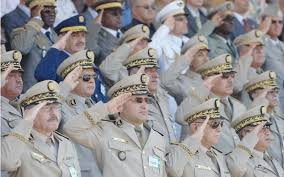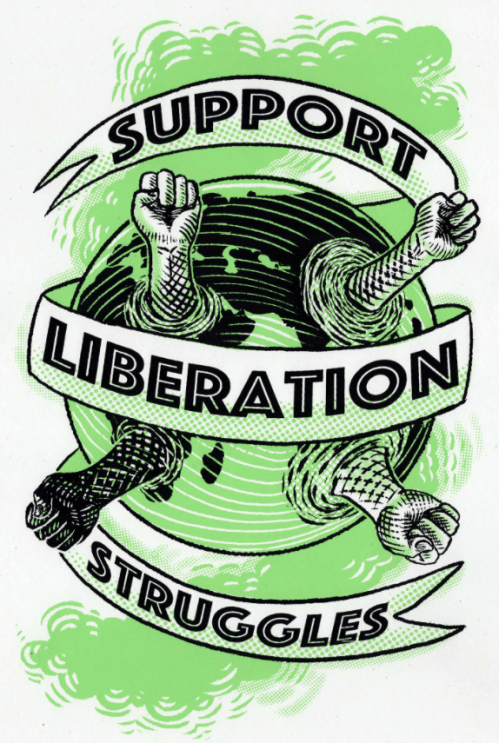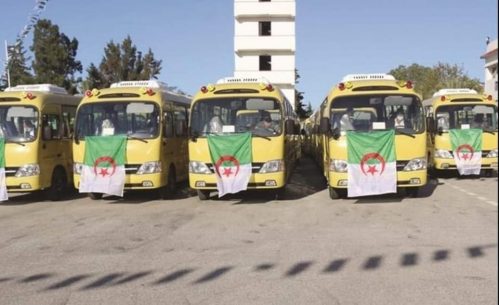Faced with the increase of media outlets whose authors cross the Rubicon shamelessly spreading their hatred of Kabylia or at least their fear driven by their supposed ignorance of all that is Kabyle, the President of the Kabyle Provisional Government-in-Exile (Anavad) and the Movement for the Self-Determination of Kabylia (MAK), Mas Ferhat Mehenni, transmitted to Siwel this tribune, which we reproduce in full below:
In 24 hours, two articles converged in their attack on the Kabyles.
Kamel Daoud’s article “Our struggles, our riches and our failures” (02/07/2019) is followed by Youcef Benzatat’s “the revolution betrayed by the Berberists” (03/07/2019), as they each draw up a report of the failure of the Friday Revolution and pin the blame on Kabylia and the Kabyles.
Although the two texts are of different pens, their conclusion is the same: The Kabyles have failed the protest movement by walking since 16/02/2019 with their own flags, that divide the Algerians and undermine the national unity. This would have given the opportunity to the Military Command (new extraconstitutional body) to put an end to the “revolution“.
In light of the anti-Kabyle racism that transpires, certainly to different degrees, through this kind of journalistic shortcuts that must be condemned, it is the duty of a political analyst to return realism to their reality.
1) – The failure of the movement is not due to Kabyle flags. They are but a small facet of this march, whose tail nor head are clearly visible. Any spontaneous movement of crowd, unorganized and without rules of adhesion or functioning, is condemned to die, sooner or later. Anarchy and “dégagisme” are perhaps beautiful ideals for their supporters, but the law of the jungle is consubstantial. There is no human society without structure, and there may be no permanent revolution, with perpetual daily agitation, where there is no order. With or without Kabyle flags, the revolution would have failed.
In addition, the Amazigh and Kabyle flags are not the only ones to be flown alongside the Algerian flag of Messali Hadj during these demonstrations. Algerians have, since the beginning of this movement, walked with the Palestinian flag, often produced in giant dimensions that no Algerian flag has matched. Until now, neither Kamel Daoud nor Benzatat nor any other non-Kabyle chronicler has been shocked to this current degree.
2) – Singular national unity is a stalemate. To be threatened by the mere presence of an Amazigh flag now brandiitd throughout North Africa is nonsense, resulting from a feverish political blindness, peculiar to racists and dictators. The dream of an Algeria without Kabyles (or without Amazighs) is equal to Hitler’s dream of a world without Jews.
3) – Naming Kabylia responsible for the failure of this revolution on the pretext that it “kabylized the movement” calls for some simple remarks:
The events taking place in Algiers have a media resonance in the country more important and wide-reaching than those elsewhere. As it is mainly populated by Kabyles (70% at least), it is natural that the slogans (Ulac smah ulac, assassin power …) and the colors of these have invaded the street and are found on some media and especially on social networks. The media power of Algiers coupled with the strength of Kabyle independence, real or perceived, manifest or latent in those who make a crowd, awakens the atavistic fantasy of a Kabyle insurgence throughout Algeria. This is further aggravated by the many Kabyle personalities who, by opportunism or in good faith, believe that they must invest themselves now in a hypothetical power to come, competing for proposals of service offers for crisis outings to which they are the only ones to believe. Despite the anti-Kabylism filthy newspapers and televisions like Ennahar, Elbilad or Echorouk …, we remain generally certain that the “Hirak” is paid for by Kabyles who make it an instrument in their takeover in Algeria.
These propositions, underpinned by culturally Kabyle values, all have some relevance that irritates here and there, perhaps to the point of affirming (like Kamel Daoud) that: “a region that is right alone, is not right. It’s just alone! ” Devil! What logic! Should he, for the sake of giving the wrong to Kabylia, go so far as to contradict an absurd truth of La Palice?
Of course, Kamel Daoud is not a racist. To assume so would be an ignominy. He is not, either, an anti-Kabyle and is not responsible for what he has repressed, for what is buried in his cultural unconscious. I think he believes that Kabylia “alone is right“, but he would like to see it finally diluted into a set, ideal and mythical, whereupon it would be dissolved. In short, a utopia he has been nourishing since at least 2014. In his mind, Kabylia is the only chance for Algeria, the only lifeboat of a sinking ship. It must be sacrificed for the sake of the other Algerians. This would be his most noble historic mission. He must therefore redouble his efforts to convince other “regions” of the correctness of this position. In other words ; this is not the moment for Kabylia to claim their freedom! He refuses to see that hesitation on the part of Kabylia would be, for her, a certain death. To resume his parable in 2014, he speaks of a Algerian boat sinking and a Kabylia who must save crew and travelers. On our side, as Kabyles, we know that under these conditions, we either save our own skin first and we come to the rescue of others afterwards, or we all perish on the spot. Would that he no longer ask us to confuse sacrifice with suicide. We often have.
He did not see how Boualem Sansal, in a video publiitd on 01/07/2019, on the facebook page “Kabylia Belle et Rebelle“, states that: “since independence, all the fights for emancipation, for the progress, and the democracy in Algeria were the accomplishments of Kabylia, because they were led by Kabyles “. Lucid, he adds: “Alas! Very loosely, we have abandoned Kabylia not only to itself, but also to the repression of Algerian power.» Contrary to the pessimistic note with which he concludes, saying that “Kabylia is now destroyed” he recognizes that “the sacred fire is not extinguiitd, it is still there.”
Thus, a “Kabylia destroyed” by the repression and indifference of others, as Boualem Sansal thinks, admiring the fight is contrasted against Kamel Daoud’s image of a Kabylia with a strong personality and powerful potential that he would like to see devoted exclusively to the rescue of Algeria and not itself? Why does the prospect of Kabylia standing tall scare the Baatho-Islamists to the point of devoting so much hatred to it and calling kabyles traitors, or even the devil itself, denounced by Benzatat, Mokri, Salhi and others?
In this climate where Sansal detonates with his always benevolent eyes on Kabylia who respects and admires him, we are witnessing in recent times a rise in power of primary anti-kabylism. This barrage against all that is Kabyle is certainly no strange thing, in light of the arrival at the top of the military power of the most racist putschist in Algeria, General Gaid Salah.
To say that Kabylia is wrong to distinguish itself by its claims or its emblems is both a direct and indirect way of justifying the actions of the torturers and executioners.
Instead of rebelling against Kabyle flags and slogans, why should not the Algerians, for once, take the step towards Kabylia to accept it as it is and not as they, themselves, would want it? They would see Kabylia with no desire, transparent, normalized, pacified and evaporated? This blind attitude of rejection of all that is Kabyle clearly shows that the “Xawa-xawa” (brothers brothers) in vogue in Algiers, is more expected in the sense that Kabyles should extend it toward others, and not the other way around. No reciprocity is to be considered. They are told that in order to finally be accepted as Algerians, they would have to stop expressing themselves with Kabylian dignity. As long as they continue to carry their values, they will be only traitors vis-à-vis Arab-Islamist Algeria and its scapegoats.
Algeria is essentially colonialist and imperialist, incompatible with democracy. These are, among others, the reasons why Kabylia rejects it and wants to be independent from it. Algeria is developing an anti-Kabyle hysteria to should recognize the existence of a people different from themselves. Just as a mistake once acknowledged is half-forgiven, a national question once raised is half-solved. The denial of reality is political autism, the denial of existence of a people is a crime against humanity. Kabylia is the sister of the people of Algeria, but can only help them from a position of recovered sovereignty when its official existence is recognized in the concert of nations.
In a context where Kabylia, whatever it does, is always perceived as a past, present and future threat to the unity of Algeria, let the threat end, not by domination and Arabization, but by the acceptance of Kabylia’s right to self-determination.
This amicable separation will put an end to these insoluble disputes and may subsequently allow a peaceful policy of good neighborliness to bloom between the two countries.






Do not forget that Mr. Daoud has the same origin as the villainous impostor who attacked Kabylia in 1963 .. these people hate the worthy resistant of old who want to remain what they are, like our contemporaries of the past centuries who had delivered battle to all the invaders! ..These henchman
descendants necessarily of a Bedouin DNA can not consider themselves at home, because in front, they meet the worthy children of this legitimate land, kabyles, who offer them the mirror, they see themselves as illegitimate in this homeland of Jugurtha, landless people, ordinary exogenous waste, tasks, in short strangers to this land and its culture. We can not tear roots from an ancient oak. Yes, our roots are, ours, hey are deep in our motherland. They, in the depths of the ages, our land vomits them like indigestion, yes a foreign body in the sense as figuratively of course! …